The Posse Comitatus Act comes for Trump's authoritarianism
Trump's efforts to go after U.S. cities — first Los Angeles and D.C., with, it appears, Chicago next — are alarming. A lot happened, as to all three cities, on Tuesday.
President Donald Trump’s effort to threaten American cities with federal military presence — a threat he has followed through on, using different authorities to do so, in two cities — got its strongest pushback yet on Tuesday morning.
In a 52-page decision that followed a trial, Judge Charles Breyer found that the Trump administration had “violated the Posse Comitatus Act willfully“ in its deployment of the military in and around Los Angeles.
The act — updated in recent years to include the Space Force in its restrictions — limits the use of military for domestic law enforcement purposes. It is a short law, so here it is:
Whoever, except in cases and under circumstances expressly authorized by the Constitution or Act of Congress, willfully uses any part of the Army, the Navy, the Marine Corps, the Air Force, or the Space Force as a posse comitatus or otherwise to execute the laws shall be fined under this title or imprisoned not more than two years, or both.
The ruling that the Trump administration violated that law in Los Angeles came hours before Illinois Gov. JB Pritzker held a news conference on Tuesday detailing what he knows about the reports that a similar action is imminent in Chicago.
Pritzker’s news included his understanding that military and federal law enforcement are already being staged in Illinois. Before Tuesday, Chicago Mayor Brandon Johnson held a news conference over the weekend putting forward a “Protecting Chicago Initiative” executive order aimed at blunting any federal efforts to come into Chicago.
And while those responses are just the beginning — and much more will be necessary if Trump moves forward — Breyer’s well-timed ruling does significant work toward explaining some of the legal limits to Trump’s efforts. Of course, it is a district court decision and Breyer’s earlier ruling in this case was blocked pending appeal by the U.S. Court of Appeals for the Ninth Circuit, but that was a quick-moving dispute over the statute that Trump used to call up the National Guard — not the extensive, post-trial decision about the Posse Comitatus Act that Breyer issued Tuesday morning.
As Breyer concluded, “[T]hese violations were part of a top-down, systemic effort by Defendants to use military troops to execute various sectors of federal law (the drug laws and the immigration laws at least) across hundreds of miles and over the course of several months—and counting.”
Breyer’s ruling, in depth
It is a careful, narrow decision by Breyer, a Clinton appointee and the brother of retired U.S. Supreme Court Justice Stephen Breyer, that began by noting, “Congress spoke clearly in 1878 when it passed the Posse Comitatus Act, prohibiting the use of the U.S. military to execute domestic law.“
The ruling contains 13 pages of findings of fact — evidence that Breyer found was established at trial — including key information about the deployment of 4,000 federalized National Guard troops and 700 Marines for “Task Force 51,” their training, and what they’ve done since.
His findings of fact included that Task Force 51 members, in their training, “were orally instructed that the four functions listed in red—security patrols, traffic control, crowd control, and riot control—were subject to a so-called constitutional exception to the Posse Comitatus Act.”
He then detailed his findings of how those exceptions and more were employed by Task Force 51 members in the months that followed, as well as the history behind and interpretation of the Posse Comitatus Act by courts, before reaching the meat of the ruling.
First, Breyer addressed the government’s argument that the statute Trump used in the Los Angeles activation (10 U.S.C. 12406) is an exception to the Posse Comitatus Act. “To start, the Court is unaware of any person—government lawyer, military or civilian official, court, or commentator—who has made this argument other than Defendants’ lawyers in this case. The Department of Defense has not taken this position in its publications on the Posse Comitatus Act,” Breyer wrote.
After detailing the irrational, expansive implications of such a claim — a reading that “would have rendered the Posse Comitatus Act effectively useless at the time it was passed,” Breyer noted — he concluded, “The Court will not take Defendants’ invitation to create a brand-new exception to the Posse Comitatus Act that nullifies the Act itself.“
Next, Breyer addressed what the Trump administration claimed is the “constitutional exception” to the Posse Comitatus Act. Here was how Breyer summed up the argument and his response:
Under this “constitutional exception,” as Defendants call it, the President has inherent constitutional authority to protect federal property, federal personnel, and federal functions, so any actions that can be construed as such “protection” are lawful in spite of the Posse Comitatus Act. This assertion is not grounded in the history of the Act, Supreme Court jurisprudence on executive authority, or common sense.
He was not buying it. Going all the way back, Breyer explained, “[T]here is little support in the Founding Era for an inherent constitutional authority for the President to call forth the militia, or to use the military generally, to execute the laws.“
He went on to explain that, legally, the argument fails both because it “ignores the actual text of the Posse Comitatus Act, which provides for exceptions only where the Constitution or Congress ‘expressly authorize[]’ them,” and because the Trump administration “adopts an expansive reading of the Take Care Clause that the Supreme Court confronted and rejected in Youngstown Sheet & Tube Co. v. Sawyer, 343 U.S. 579 (1952)“ — a key decision addressing the balance between executive and legislative powers under the U.S. Constitution.
“That Defendants characterize this as an ‘exception’ to the statute is mere wordplay; it does not change the fact that they seek to override Congress’s legitimate exercise of its own authority,“ Breyer wrote. “The President thus cannot declare an exception to the Posse Comitatus Act any more than he can refuse to follow it outright.“
With those two “exception” arguments rejected, Breyer easily concluded that Task Force 51’s actions in Los Angeles and surrounding areas violated the Posse Comitatus Act.
“This was intentional—Defendants instigated a months-long deployment of the National Guard and Marines to Los Angeles for the purpose of establishing a military presence there and enforcing federal law,” he wrote. “Such conduct is a serious violation of the Posse Comitatus Act.”
After some additional discussion of the propriety and form of relief, Breyer ultimately issued a narrow injunction that, in essence, barred the Trump administration from using federal troops in California “to execute the laws“ — in other words, follow the Posse Comitatus Act — unless the federal officials actually “satisfy the requirements of a valid constitutional or statutory exception“ to the law.
He stayed the injunction for 10 days — presumably to allow time for implementation but also, practically, to allow for any appeal.
What about DC?
Across the country, Washington, D.C., is nearing the end of the 30-day period authorized under the D.C.-specific Home Rule Act for Trump’s “emergency” actions here.
On Tuesday, D.C. Mayor Muriel Bowser’s office issued a news release putting forward a “Pathway Forward Beyond the Presidential Emergency.“ Along with it, Bowser issued an executive order setting forth some elements of that implementation, including the creation of “the Safe and Beautiful Emergency Operations Center (‘SBEOC’).”
This order got a harsh response, in no small part because of the egregious mischaracterization of the order by The Washington Post in its top-story online placement and social treatment on Tuesday afternoon.
As I made clear on Bluesky, I have many issues with the way Bowser has handled and is handling all of this. I think the city needs a stronger leader in this moment.
But, the characterization by the Post — the entire framing of the story — was irresponsible and inflammatory. It was also both exactly what Trump’s team wanted and the most likely to create outrage at Bowser.
It also ignores that 90% of what happened today is about the background.
First, Bowser’s order — and the Safe and Beautiful Emergency Operations Center — is pretty clearly an effort to minimize the chances of Trump seeking to extend the emergency, as he could seek to do through Congress under the federal law in question.
Second, federal law enforcement, as opposed to the troops, are always here and there are limits, particularly in an antagonistic environment, as to how D.C. officials can address concerns about their use. Further, beyond the August order declaring the emergency in D.C., an underlying, earlier Trump order from March established the “D.C. Safe and Beautiful Task Force“ — a federal task force that will remain in effect after the 30 days.
With those two realities in mind, note what Bowser says is the purpose of the center being established in her order. It is “to manage the District's response to the Task Force, the Presidential declaration of emergency and on a continuing basis” and will “coordinate centralized communications; formulate post-emergency planning; formulate post-emergency operations; and ensure coordination with federal law enforcement to the maximum extent allowable by law within the District.“
It is far from ideal, but, if you look at the ongoing federal-led efforts with its task force and think about the limits D.C. government has in addressing federal law enforcement even in the best of times, it is not hard to see this as an effort to create a channeled engagement with federal officials that — at least, Bowser presumably hopes — will prevent any further efforts by Trump to send troops into the city or even consider more aggressive steps to subvert D.C. home rule.
Now, this tightrope-walking shouldn’t be the aim of everyone — or even most people — and it absolutely shouldn’t be the response from actual states, but Bowser’s actions today are simply not what the Post claimed they are.
The two greatest signs that this was a propaganda win for Trump: White House Press Secretary Karoline Leavitt gushed over it while using it as a not-at-all-subtle threat to others …
… and the Post later changed the headline (a bit):
The bottom line, Post irresponsibility notwithstanding, is that federal law enforcement while Trump is in office is going to be focused on D.C. Bowser has made the decision that being coordinated is better than not. She might turn out to be wrong — and I think there have been many times, including in this order, where she is too kind to Trump, the Trump administration, and their aims — but even this toned-down headline from the Post is ignoring the underlying, difficult realities in D.C.
Finally, a return to Chicago — and looking forward
At Tuesday’s news conference, Pritzker said that he has reason to believe the Trump administration is “staging the Texas National Guard for deployment in Illinois,” among other preparations.
In response, he was blunt.
“We know, before anything has happened here, that the Trump plan is to use any excuse to deploy armed military personnel to Chicago,” he said, noting that Trump would gladly use a thrown sandwich to claim there was an emergency in Chicago to justify sending in troops. “None of this is about fighting crime or making Chicago safer.”
If, as appears likely, the Trump administration is going to do something in Chicago, there will undoubtedly be some aspects of whatever it seeks to do that will be permitted under federal law.
As with Los Angeles and Washington, D.C., though, it is essential that the administration explain what legal authority it is using to take any action — and that reporting properly cover that authority and its limits. That is the law, and it is bad reporting to simply characterize the action as Trump and his team wishes. It is also dangerous in this moment, as it almost always is a framing that seeks to buttress Trump’s authoritarian aims.
Additionally, then, when steps are taken without authority or beyond the authority they have, reporting must also accurately describe that. At that point, and as we have seen in L.A. and D.C., litigation and public outcry will almost certainly follow. As it should.



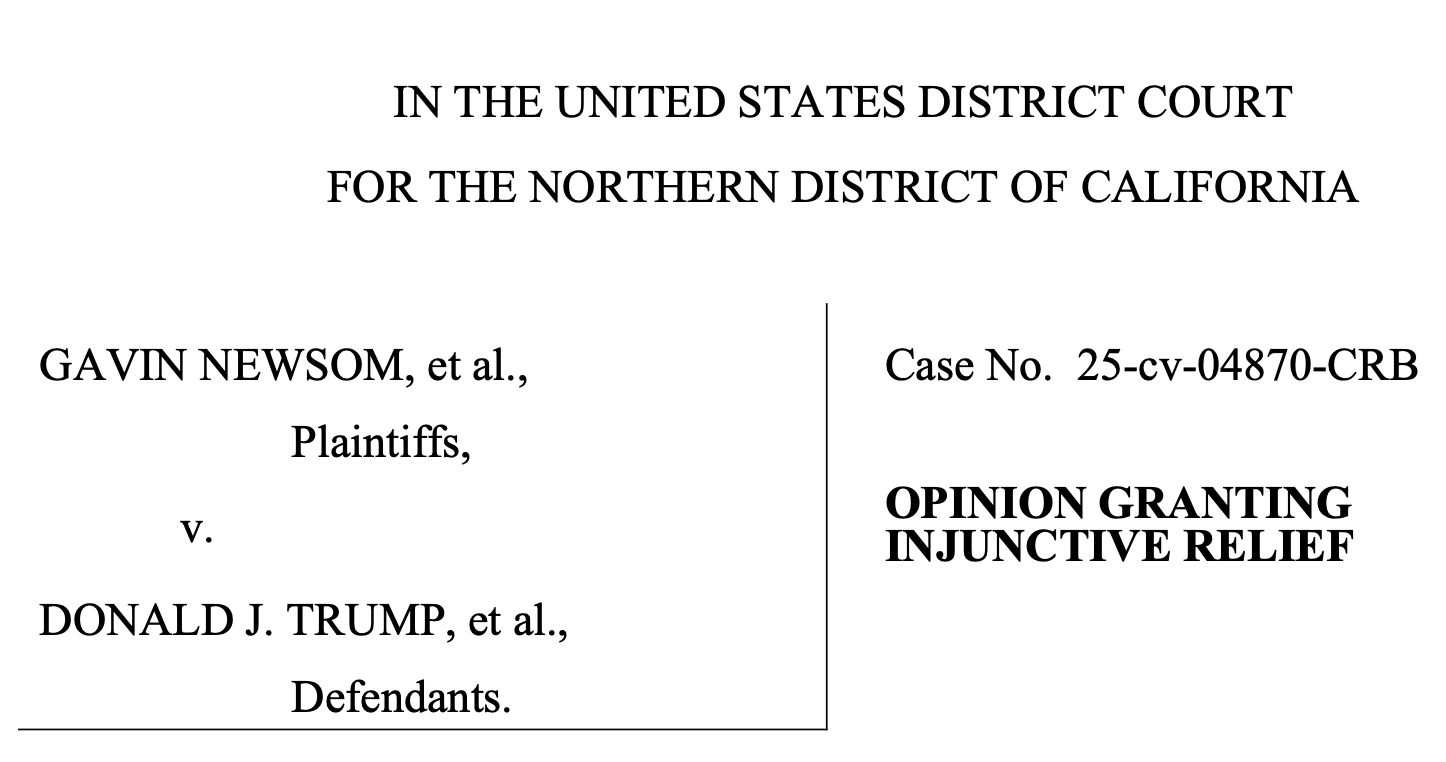
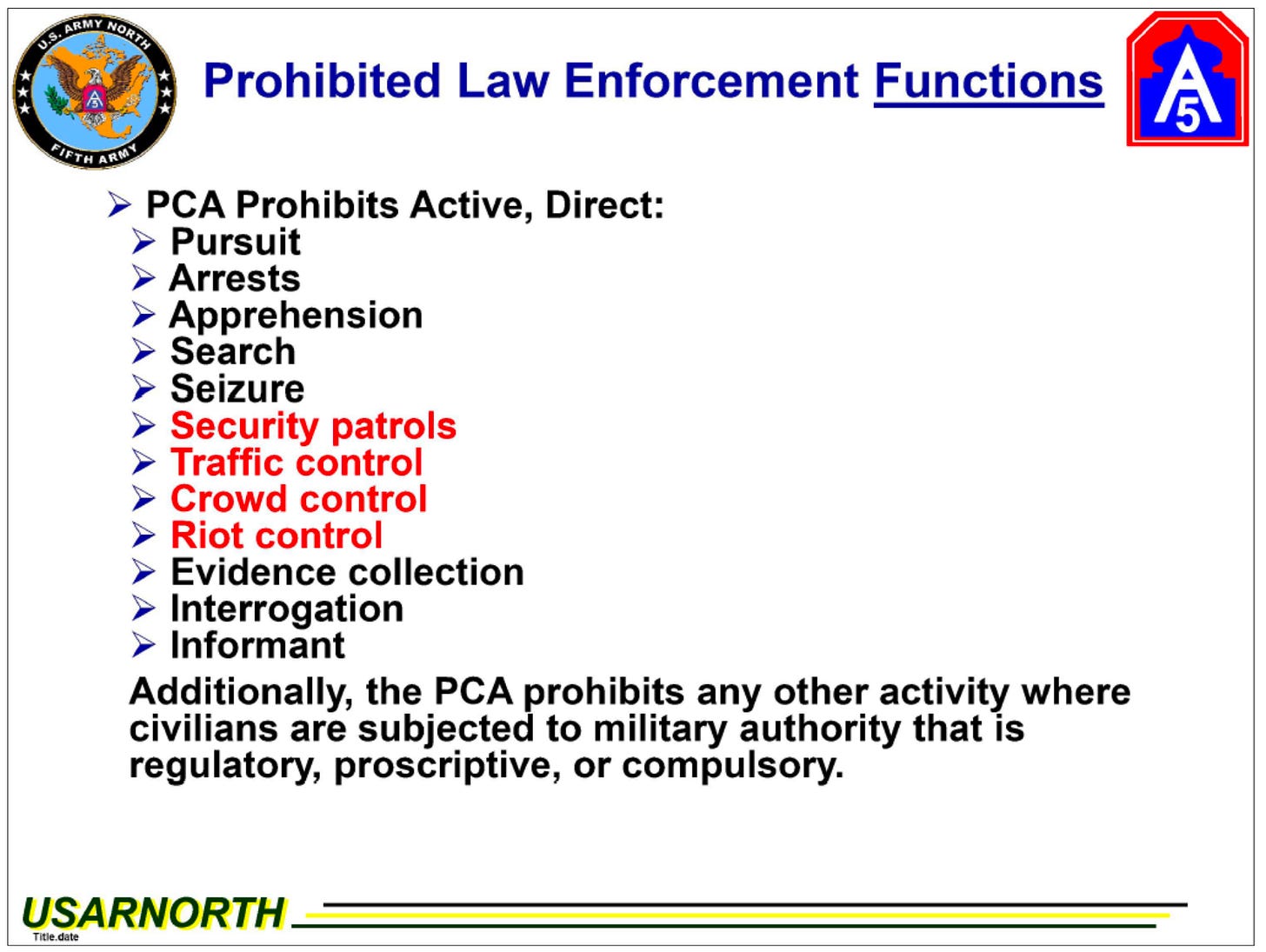
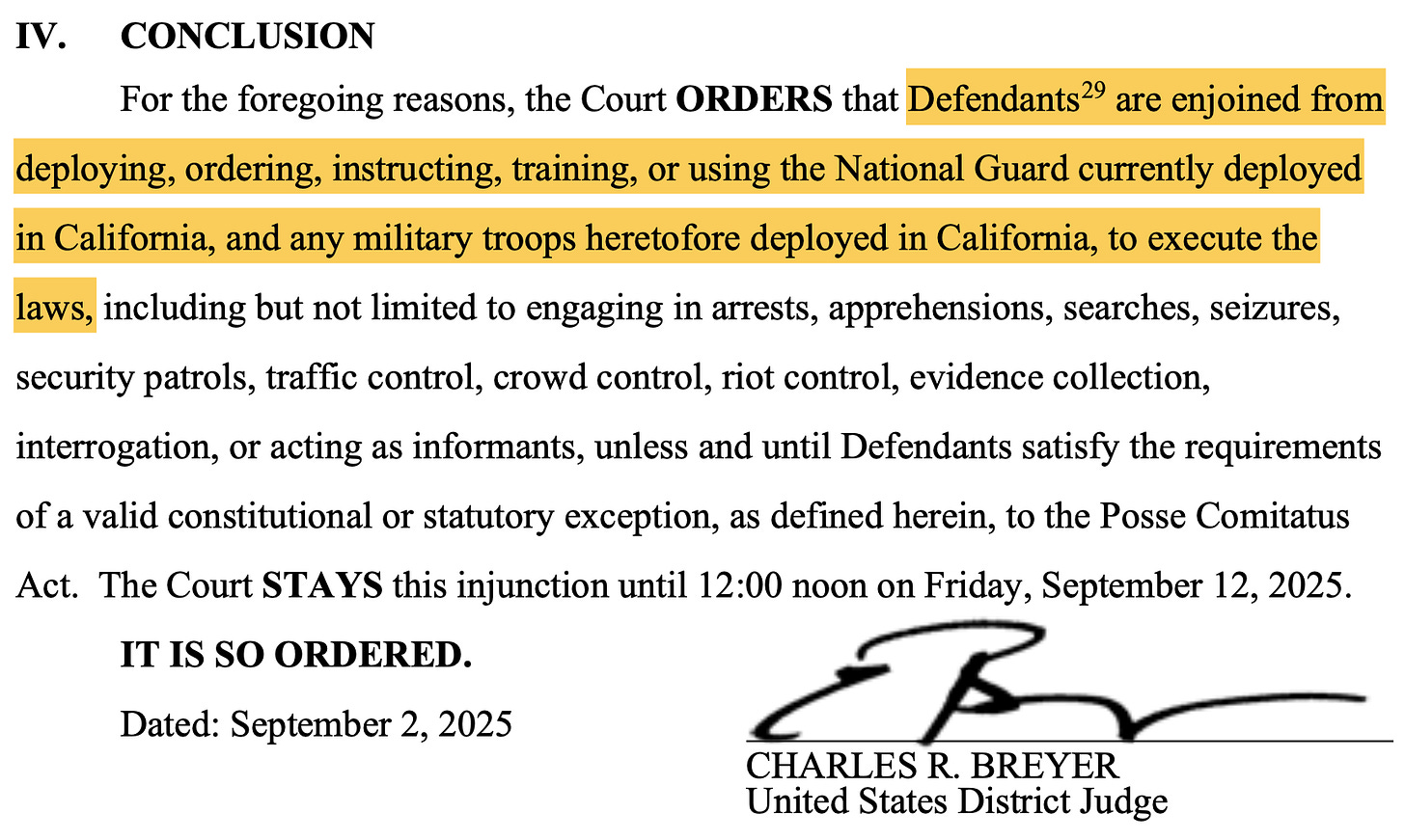
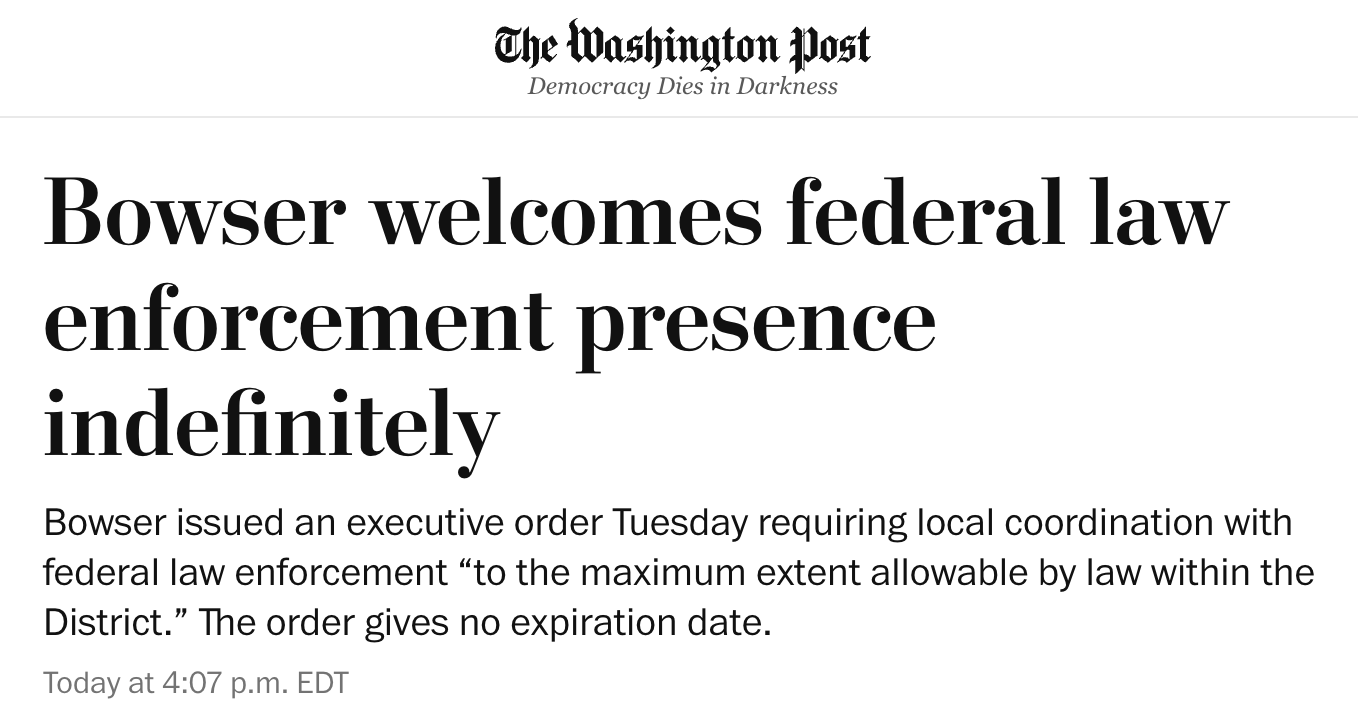
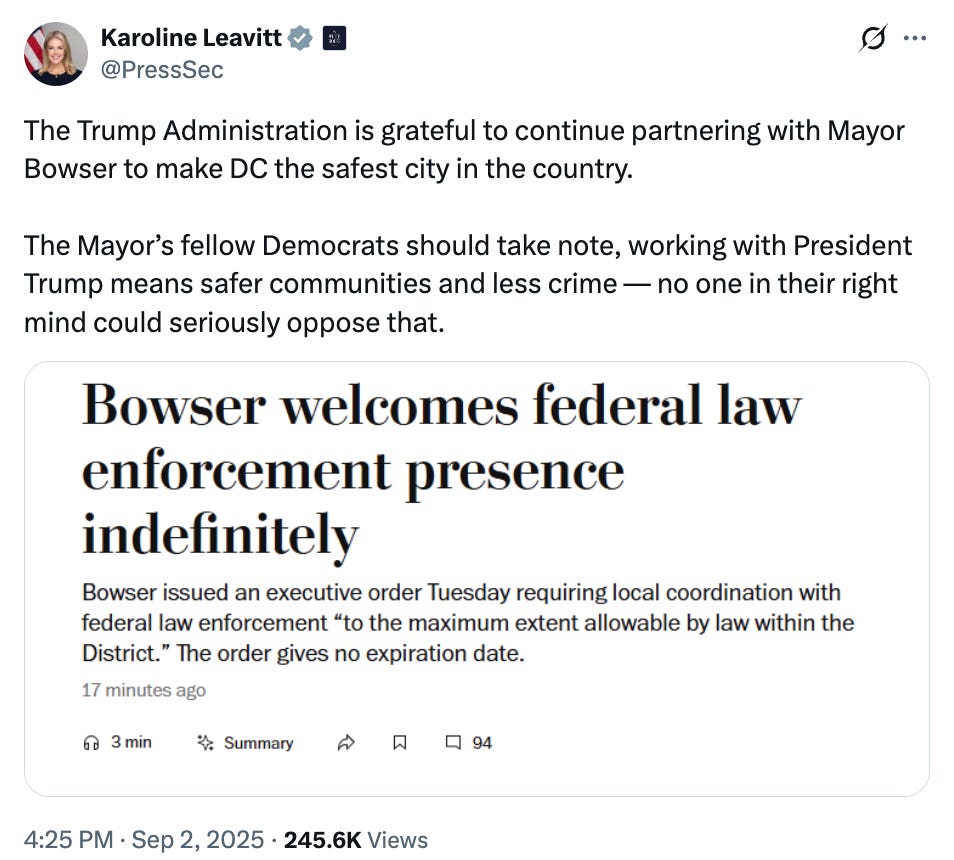
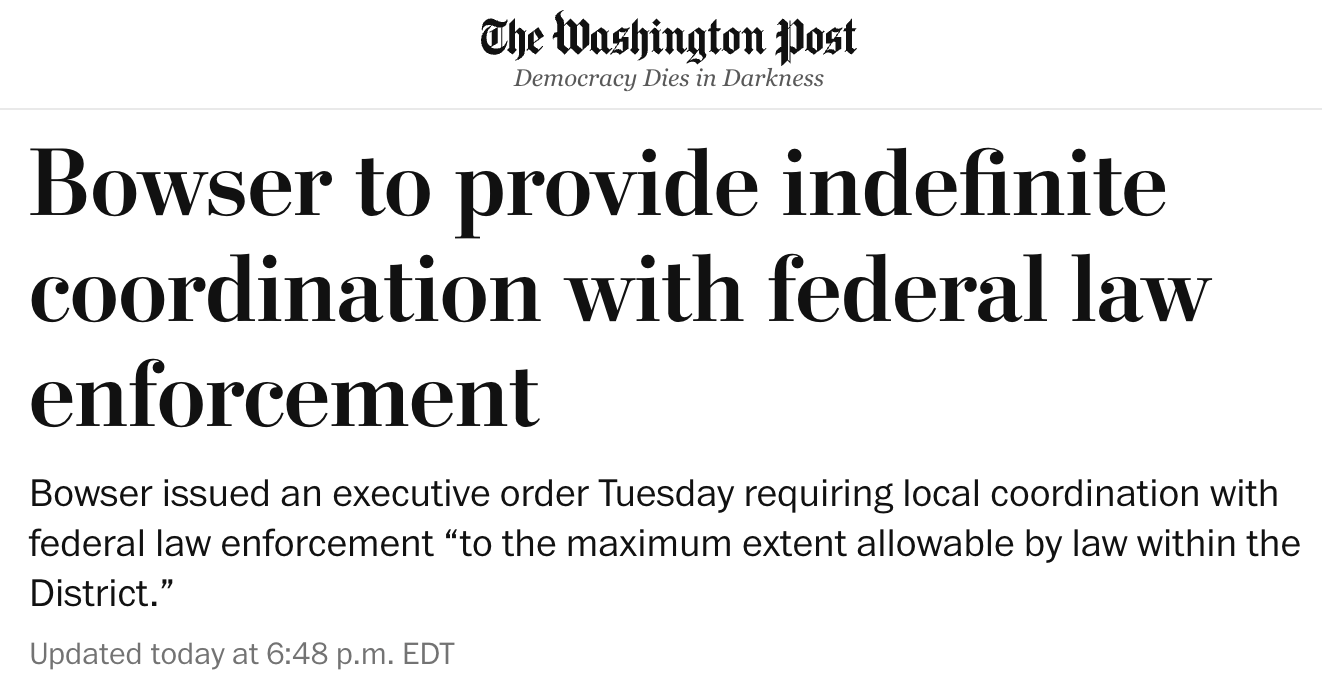
I reread the link, and I agree. I would much rather that someone would gallop in and arrest him for ignoring court orders, but we have to keep acting as though the system works, even when it doesn't, because sometimes it will. It is exhausting, but if we keep it up and continue to push against him hard, there is hope!
I'm glad Judge Breyer took the time to walk through all of these legal arguments.
Curious to see how five Supreme Court justices will argue that the president has the power to use the military in this way. I can't imagine them ruling against Trump on anything of importance.